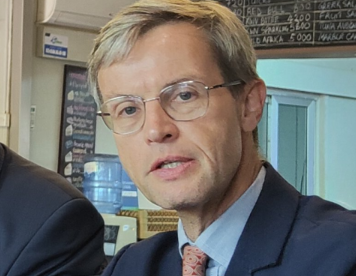The Deputy Head of the European Union (EU) Delegation to South Sudan on Wednesday said that without the rule of law, peace cannot be sustained, human rights cannot be realized, and economic development will be stifled.
Lothar Jaschke made the remarks at the launch of the strategic plan 2025-2029 of the Judiciary of South Sudan and reminisced about the key recommendations of the report of the Judicial Reform Committee, validated on 23 October 2024.
“I remember the ensuing three-day workshop in October [2024] with engaged discussion around the 15 key recommendations of the report to reform South Sudan’s Judiciary and the justice sector,” he recollected. “They concern issues like training, welfare, infrastructure, governance, restructuring of the judiciary – with the objective to create an effective and independent judiciary, accessible to all that holds up the rule of law.”
“Who would invest in a country without a credible judiciary and without a guarantee that the rule of law will be upheld?” Jaschke asked.
He stressed that judicial reform is not only about improving the courts’ functionality and the appointment and promotion scheme of judges.
“It is also about public trust and the rights and dignity of every citizen. It is about ensuring that laws are applied consistently and fairly, and for everybody. It is about ensuring that all citizens have legal recourse when their rights are violated,” he emphasized. “It is about ending impunity. It is about public trust in the system. It is about accountability to prevent future conflicts.”
The envoy highlighted that one of the findings of the JRC report is that some members of the executive bodies interfere with the independence of the Judiciary.
“I hope there will be a way to address this issue. It is key for a well-functioning and effective judiciary to be independent and impartial. Let me emphasise the importance of an independent and effective judiciary for human rights,” Jaschke stated. “The Transitional Constitution of South Sudan includes a list of human rights. One is the right to due process, but not detention without charges and without access to lawyers. In this respect, we welcome the recent conclusions of the AU’s PSC.”
“Today’s launch is also part of the implementation of the peace agreement towards a reformed justice system,” he added.
According to Jaschke, the EU strongly encourages more efforts and more government funding towards its implementation, towards the unification of forces, towards holding of free, fair, and inclusive elections, and towards the adoption of a constitution on a democratic and federal basis.
“The European Union has been actively engaged in supporting legal and judicial reforms, promoting good governance and strengthening the rule of law in South Sudan since the country’s independence in 2011, and we are proud to accompany you,” he added.
The EU supports judicial reform, including constitutional reform, through the Max Planck Foundation and its project Supporting Constitution-Making, Legal Harmonisation and Judicial Reform in South Sudan. The project provides technical assistance focused on enhancing the capacity and independence of the judiciary. It provides training for judges, lawyers, and court officials to improve the judicial system’s efficiency and effectiveness, particularly at the level of High Courts and lower courts. It supports the creation of institutions key towards an independent judiciary that delivers justice for all.
“The European Union is committed to supporting South Sudan to transit to a stable, peaceful, and democratic country. But for this we need trust and confidence, dialogue and cooperation among all political forces of the country, and not conflict and detention,” Jaschke concluded. “Today’s launch presents an opportunity for all, but notably to the South Sudan institutions and people, to look ahead and develop a concrete work plan, addressing the main challenges and showing true commitment towards a robust judicial system, bringing accountability, transparency, good governance, dignity and justice to the people of South Sudan. Let us look into justice’s beautiful face.”




